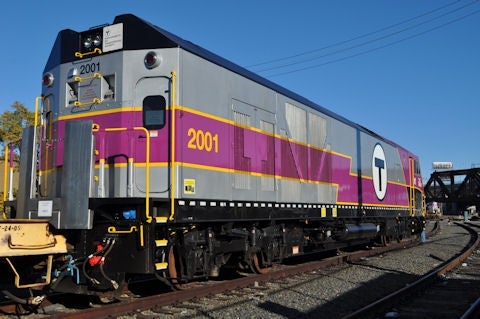With no discussion, Massachusetts transportation officials received a go-ahead Monday for new agreements with the commuter rail operator that would pay it another $15.3 million in a year while establishing new penalties designed to ensure there are adequate trains on hand for weekday service.
The MBTA’s Fiscal and Management Control Board authorized the general manager to negotiate the changes during the public session of Monday’s meeting. Control board chairman Joe Aiello said the issues had been previously discussed by the board in public and private sessions.
The new payments and new penalties aim to improve the experience for passengers, Transportation Secretary Stephanie Pollack told reporters. She said the changes were not designed to aid Keolis Commuter Services, a French company that has lost tens of millions since taking on the commuter rail contract in 2014.
“They got off to a rocky start but they have been a good partner,” Pollack told reporters. She said the changes – which the company has agreed to in concept – aim to “double down on our relationship with Keolis.”
“As long as we have more business it will help us to lose less money,” Keolis Deputy General Manager Franck Dubourdieu told reporters. He said, “For the time being we are still in the red but we are absolutely dedicated to turn this business around and it looks like we have the support of the MBTA to do so.”
About $11 million would be paid annually out of the T’s operating budget for Keolis to keep another nine locomotives and 12 coaches in repair, as well as to account for the increased maintenance costs associated with new locomotives and changes to the schedule.
Another $4.3 million in capital dollars would be paid to Keolis as part of a pilot to see if performance standards improve if more repair work is done on the commuter rail fleet, Pollack said.
Those additional payments would be paired with up to $1.8 million in new annual penalties, including up to $780,000 annually for failing to make at least 67 locomotives available per weekday, up to $520,000 in penalties per year for making less than 369 coaches available per weekday, and up to $500,000 per year for failing to show a reduction in mechanical failures on the equipment.
“It’s higher than the standard of the current contract,” Dubourdieu told reporters after the vote.
Pollack said the MBTA pays Keolis to keep vehicles in repair, and even though the contract says 67 locomotives should be available for service every weekday, it does not include penalties for failure to live up to that.
The current contract requires the vendor to keep 81 locomotives in repair, and the changes would boost that number to 90. The changes Pollack described would add 12 coaches to the fleet Keolis must keep in repair, bringing the number of coaches up to 420.
Pollack said it is typical for firms to be required to have a cushion of vehicles kept in repair in excess of the amount needed for service.
“In the contract they kept it tight at 81. We’re just increasing it,” Pollack said.
“In order to have really 67 every day we need to have a larger spare ratio,” said Dubourdieu.
Pollack said the MBTA would continue to supplement the commuter rail with extra assistant conductors and a passenger information center at a cost of $5 million, which is funded through penalties Keolis incurs for failing to meet performance standards.
Keolis won the contract under the Patrick administration, and for the past two years has run diesel rail service for passengers who use 130 stations and travel over more than 600 miles of track.
The eight-year contract called for the T to pay Keolis $2.69 billion. The $11 million per year increase would essentially add another $66 million for the remainder of that agreement.
Keolis beat out the incumbent firm, Massachusetts Bay Commuter Railroad, which offered a higher price. Jim O’Leary, the chairman of the old commuter rail vendor, previously told the News Service that a hypothetical adjustment of the contract that makes it more favorable to Keolis “undercuts the integrity of the process.”
Pollack also said the arrangement with Keolis “omitted” a transition plan in case the MBTA decides to terminate the contract. A proposed adjustment would add that language to the agreement “not that it’s contemplated in any way at this time,” said MBTA Chief Counsel John Englander.

